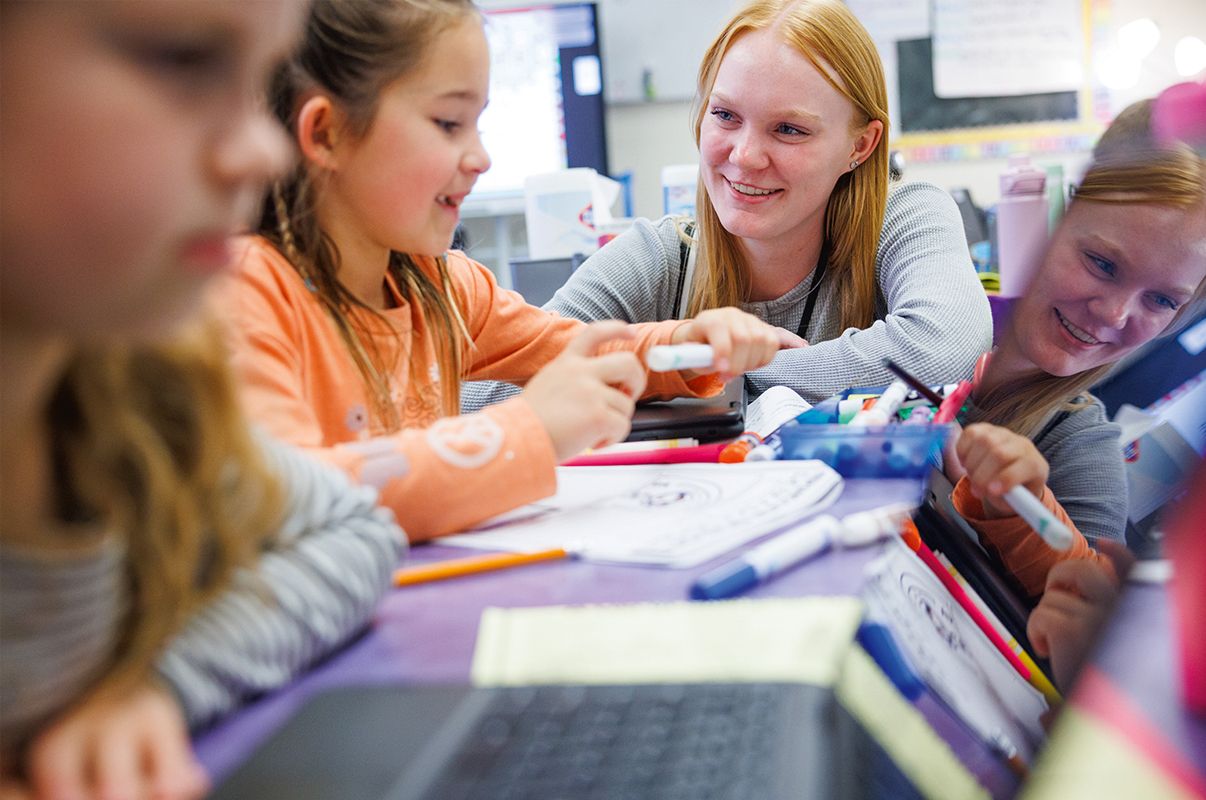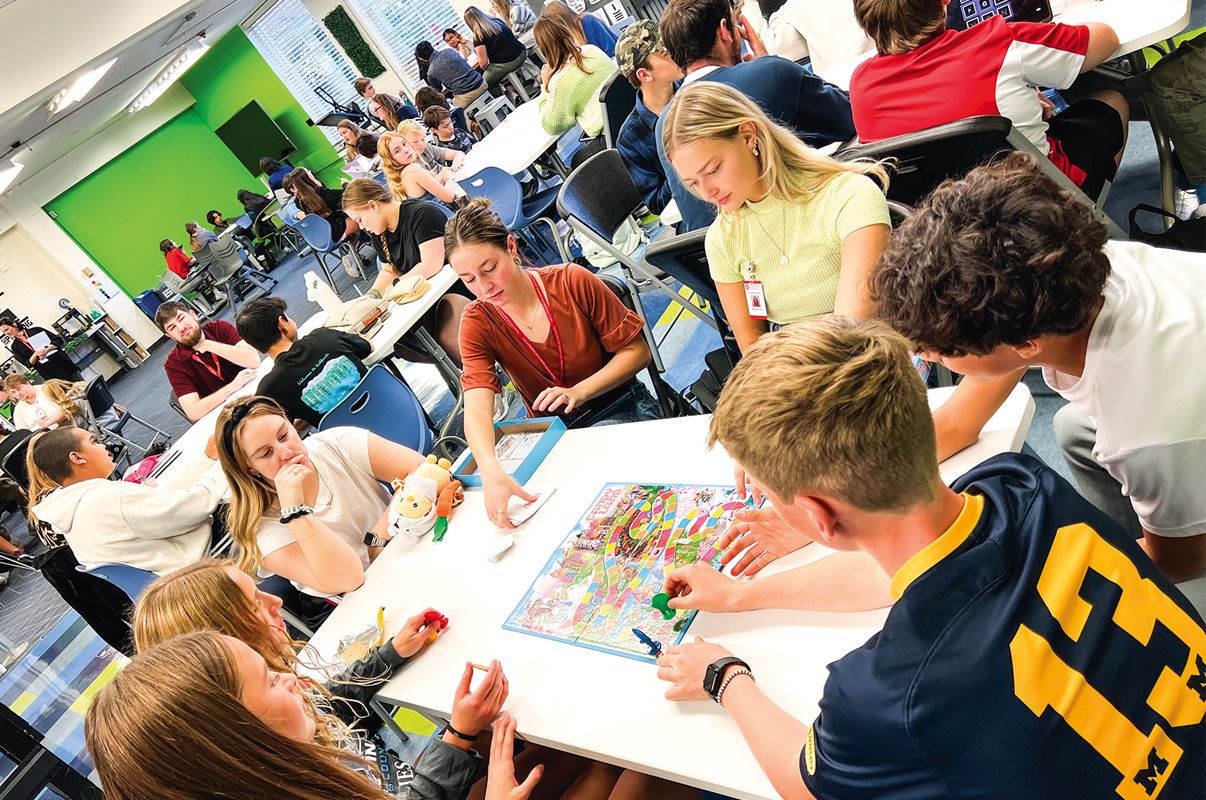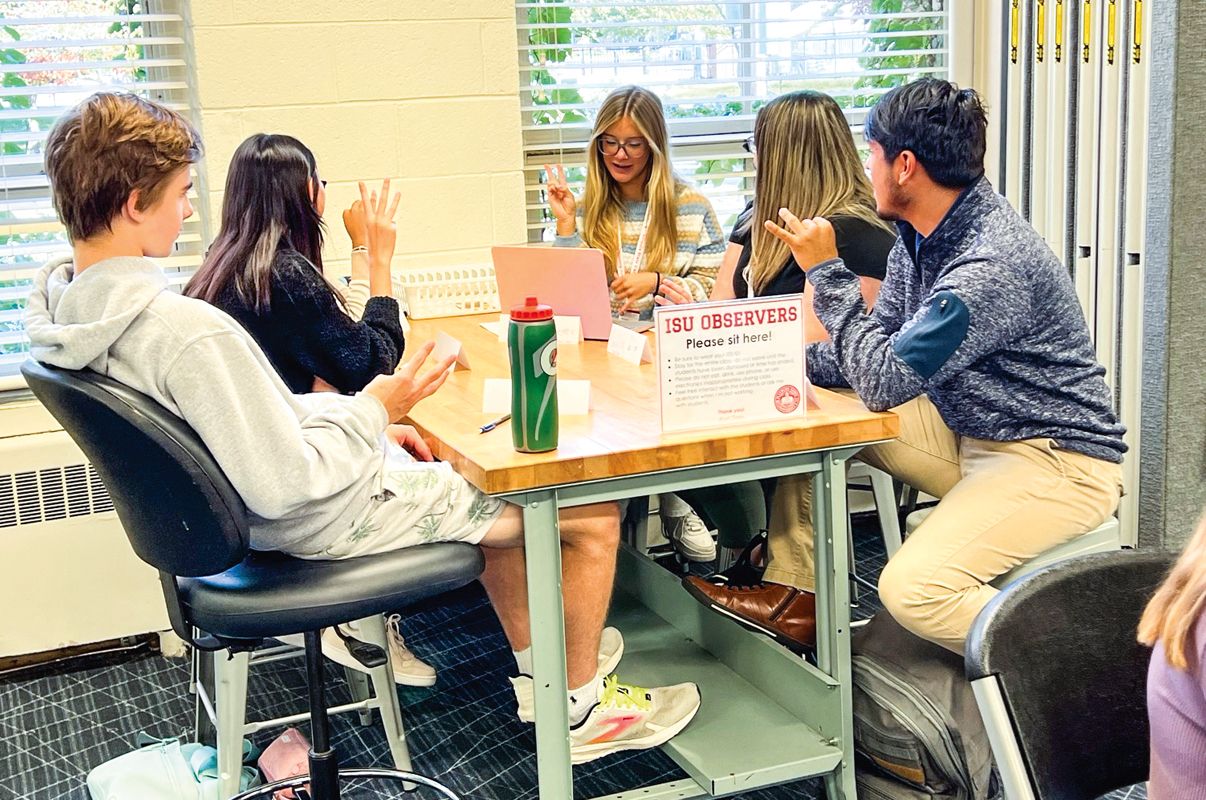University Lab Schools
CREATE NEW POSSIBILITIES FOR EDUCATORS AND LEARNERS
By Tommy Navickas
Most Illinois State teacher education alumni can recall their first experience meeting Thomas Metcalf Wildcats and/or University High School Pioneers. Their Redbird experiences were influenced by what Lab School Director Dr. Anthony Jones calls “safe and brave spaces to experiment with instructional practices, research theory to practice, and an opportunity for immediate feedback through teacher mentors.”
The partnership between the University and Lab Schools is nothing if not symbiotic. These connections inspire new ideas, explains Dr. Barb Meyer, a fierce advocate for connecting the buildings on University and Main Streets.
“The lab school’s faculty associates and College of Education faculty work together on committees, research projects, and professional development opportunities,” said Meyer, an associate professor in the School of Teaching and Learning and former associate dean for the college. “We are all colleagues, and we are better for these collaborative opportunities.”

Empowering families with communication strategies
When parents first learn their child has profound hearing loss or deafness, they’re often overwhelmed with emotion, feeling unprepared and fearful for their child’s future. But for many families connected to Illinois State University’s partnership between the Department of Special Education (SED) and the Heart of Illinois Low Incident Association (HILIA) at Metcalf School, that initial fear transforms into confidence and hope.
Through groundbreaking research, grant-supported programs, and hands-on collaboration, Illinois State’s educators are changing the narrative for families with children who are deaf or hard of hearing (DHH), starting as early as birth to age 3.
“Parents gain a sense of determination and purpose when they’re incorporated into early interventional strategies,” said Dr. Rachel Wells, Ed.D. ’23, an Illinois State alum and speech-language pathologist at Metcalf.
Wells, whose dissertation focused on parent-led communication strategies, showed how coaching caregivers to use natural, everyday interactions with their child leads to stronger functional communication outcomes. Rather than stepping aside during therapy sessions, parents now take an active role—something Wells sees as vital.
“I feel strongly about coaching caregivers to be partners during therapy sessions, as opposed to taking a passive or spectator role,” Wells said. “After all, caregivers know their child better than anyone.”
Wells’ work was supported by her dissertation committee and especially by Dr. Allison Kroesch, assistant professor in SED, whom she calls her “dissertation MVP.” Nationally recognized DHH scholar and faculty emeritus Dr. Maribeth Lartz also played a pivotal role in shaping Wells’ research.
After completing her Ed.D., Wells had the opportunity to co-teach with Lartz, continuing the cycle of passing knowledge to future educators.
At Metcalf, Wells works closely with HILIA preschool teacher and fellow Redbird alum Lily Plummer ’20, M.S. ’24. The two share a passion for empowering families and are working together to co-author research on the topic. Plummer was also involved in LIMITLESS, a grant project led by Lartz and SED Associate Chair Dr. Mindy Ely. The work, which concluded in September 2025, focused on parent-implemented early intervention strategies.
“It’s a low-incidence disability, so families are often grasping at straws looking for ways to communicate with their child,” said Plummer. “Rachel’s work reminds me to empower families as much as possible—they are the experts on their own kids.”
Both Wells and Plummer work closely with Redbird students in deaf and hard of hearing and communication sciences and disorders programs, modeling the same collaborative practices they use with families.
Kroesch and Lartz see the ripple effects of the partnership across the University and beyond.
“SED and Metcalf’s collaboration has really blossomed, and the College of Education has championed it all,” said Lartz.“From parents and children to future teachers and their students—the benefits keep growing.”
“And as faculty, we’ve learned so much along the way,” added Kroesch.

Redbird future teachers learn from middle level Wildcats
The morning bell rings through the hallways of Thomas Metcalf Laboratory School on a cold January day. Inside a brightly lit eighth-grade classroom, teacher Mike Jones turns to the new Redbird student teacher who will be by his side for the next 16 weeks.
“Go ahead and chat with the students as they walk in,” he says with a smile.
The aspiring educator’s eyes widen—like a best man caught without a toast. “But what do I say to them?!”
That moment of hesitation—that “duck-out-of-water” feeling—is exactly what Jones and his colleague, Dr. Kristina Falbe, an associate professor, hoped to change. They saw a missing piece in Illinois State’s middle level education major: more authentic, unstructured time with real middle schoolers.
In 2019, they launched a creative solution, just across University Street.
Each semester during TCH 130, sophomore teacher candidates from Illinois State trot over to Metcalf to meet with Wildcats in the seventh and eighth grades.
Over two months, the groups meet weekly, building relationships 30 minutes at a time.
“We wanted Metcalf students to talk about their own identities—their paths, experiences, and goals,” said Jones. “That gave our teacher candidates a window into who these kids are, beyond academics.”
The weekly chats aren’t always formal. Some take place over custom-designed games of Candyland or other low-pressure activities. The goal? Connection.
Senior middle level major Halle Modloff said the experience deepened her understanding of adolescent development.
“It really opened my eyes to who middle schoolers are as people—how they think developmentally, not just academically,” she said.
She was also surprised at how naturally she connected with them.
“They struggle with some of the same things I did—sports, friendships, self-confidence,” she added. “And I draw on those conversations now in my clinical experience at Chiddix Junior High.”
Now, the experience is a core part of the curriculum under the leadership of Dr. Meghan Kessler, who joined Illinois State in 2023 as an assistant professor in middle level education.
“I see my students tapping into their teacher voice and leaning into their strengths to meet the needs of kids,” Kessler said. “It’s a really organic, iterative clinical experience.”
And it’s making a lasting impact on both sides.
Jones observes his Metcalf students talk about high school, college, and the future with less apprehension.
One of those students put it best: “These conversations made me feel a lot more confident about the future. Before, I thought I had to have everything figured out right away. But now I know it’s okay to take things one step at a time. If I work hard and stay open to new opportunities, things will fall into place.”
